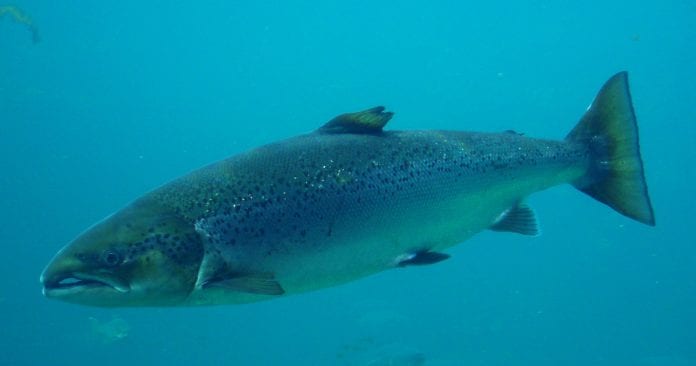Canadian fisheries officials say their research concludes there are minimal risks to sockeye salmon in the Fraser River in British Columbia of an infectious virus from Atlantic salmon farms transferring to wild populations.
Current fish health management practices such as vaccination and eradication of infected fish help to minimize the risk, according to Fisheries and Oceans Canada in Ottawa.
The advice in the report on infectious hematopoietic necrosis virus (IHNV) was developed by consensus of the peer review group of 39 experts from various disciplines, Canadian officials announced during a teleconference from Ottawa on Dec. 20.
The release of the government’s science report comes in the wake of a decision of Washington state officials to cancel an Atlantic salmon farm lease for Cooke Aquaculture Pacific, the Canadian firm that operated the salmon farm where more than 160,000 adult fish escaped into Puget Sound last summer. Public Lands State Commissioner Hilary Franz said that decision is final, and the Washington Department of Natural Resources is working with Cooke to complete an orderly shutdown and removal of the farm in Port Angeles, the Seattle Times reported on Dec. 17.
Franz said in a news release on Dec. 17 that is was clear that Cooke violated the lease terms for its Port Angeles net pens and that the company failed to maintain the salmon farm in a safe condition, posing risk of another escape. The farm’s net pens currently hold some 700,000 Atlantic salmon, she said.
Canada’s DFO report is the first in a series to assess the risk of pathogen transfer associated with aquaculture activities to wild fish and the environment in British Columbia’s Discovery Islands.
IHNV is a virus native to the Pacific Ocean environment and while it may occur in wild salmon, farmed Atlantic salmon are more susceptible to the disease.
Nine additional pathogens occur in the Discovery Islands and the next series of studies will be conducted on four bacterial pathogens over the next half year., DFO officials said.
A fish health management plan must be in place for all fish farms, but the vaccine is not a current requirement, they said. A number of the companies have eco-certification in place and have to use the vaccine if available, they said.
DFO officials said that audits of fish farms are conducted on a regular basis, with samples collected and results of testing available on the government’s website, but that no IHNV has occurred on fish farms where the vaccine was used.
According to the science advisory report released by DFO the likelihood for juvenile Fraser River sockeye salmon to be infected and become diseased due to IHNV released from Atlantic salmon farms “ …is estimated to be extremely unlikely with reasonable uncertainty given current health management practices (i.e. vaccination, surveillance for early detection an depopulation) that limit the amount of potential IHNV shed into the environment from infected farms.”
The science advisory report also noted that uncertainty in this assessment is driven by the lack of knowledge of the precise residence time of both juvenile and adult sockeyes in the Discovery Islands, local migration routes and occurrence around Atlantic salmon farms.
The report also acknowledged lack of knowledge on IHNV mortality rates for post-smolt sockeyes, and other potential impacts of an exposure of sockeyes to IHNV at marine life stages.
The science advisory report was from a December 2016 national advisory meeting on assessment of the risk to Fraser River sockeyes due to infectious hematopoietic necrosis virus transfer from Atlantic salmon farms in the discovery Islands.















